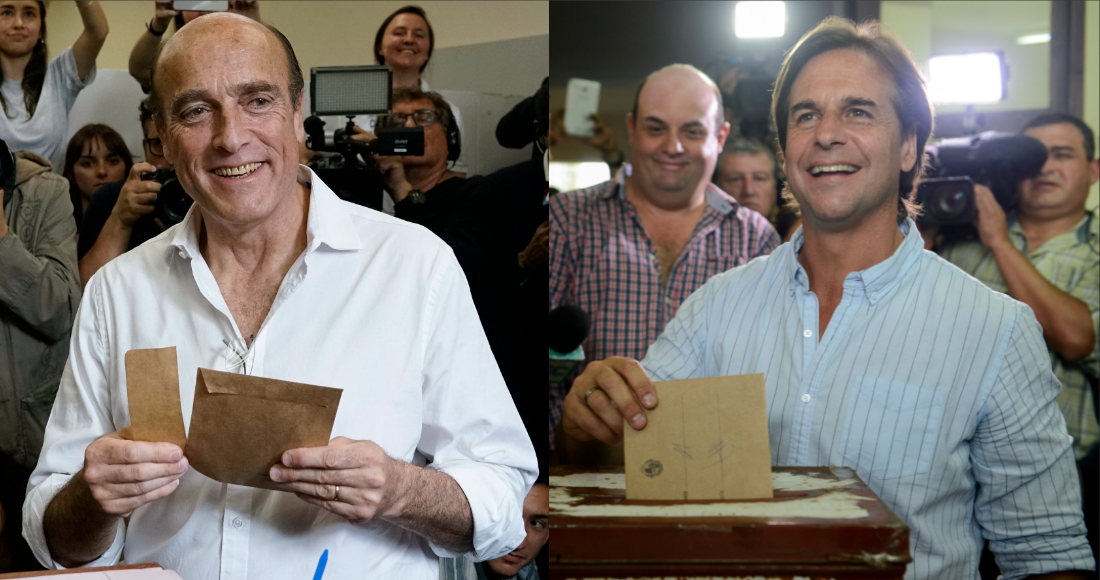According to the preliminary results of the presidential elections held in Uruguay on October 27, Daniel Martínez of the ruling left-wing government of the Frente Amplio or the Broad Front will face off Luis Lacalle Pou of the right-wing National Party on November 24.
With nearly 55% of the votes counted, Martínez maintains a lead with 38% of the votes, while his main contender Lacalle holds the second position with 30% of the votes. Following the top two candidates are Ernesto Talvi of the center-right Colorado Party with 13% of the votes and Guido Manini Ríos of a new right-wing party Open Cabildo Abierto with 10% of the votes.
If this tendency holds and neither of the candidates receive majority, i.e., more than 50% of the votes, there will be a run-off election between Martínez and Lacalle in November. The winner of the elections will start his five-year term on March 1, 2020.
Martínez has announced that if he is elected as the new president, he will continue to guarantee stability in the country. “We will continue doing everything we can to ensure stability and certainty. Uruguay has to continue growing, distributing wealth and being a nation of justice. Long live Uruguay!,” he tweeted.
Over 2.7 million Uruguayans were eligible to elect the country’s new president, vice president, 30 senators and 90 members of parliament for the period of 2020-2025. The level of participation was high as it is obligatory in the country. Around 90% of the population exercised their right to vote.
Meanwhile, the controversial “Living Without Fear” reform, presented by a senator of the National Party, was also voted on and was rejected by the majority of the people in the popular referendum. The said reform sought the creation of law that would allow night raids by police, creation of a National Guard with members of the Armed Forces, and would reduce the rights of a detained person, such as not allowing early release for certain crimes and even life-time imprisonment for crimes considered serious.
On October 22, a massive mobilization was carried out in the capital, Montevideo, against the reform. It was called for by the National Platform “No to The Reform”, an organization that led the initiative under the slogan of “Let’s march: hope the fear doesn’t consume you”.
Given the rejection of the reform, Martínez is also hoping for an outright victory in the first round based on the successes of the three previous governments of the Frente Amplio, headed (twice) by Tabaré Vázquez and (once by) José Mujica, who established their policies on an economic development model with social inclusion.
The Frente Amplio has been running the country and the congress for more than 14 years. The progressive government has spent considerably on a number of social programs in education, healthcare and housing sectors. Since 2004, when it first took over the presidency, poverty decreased significantly from 39.9% to 8.1% in 2018 and rate of extreme poverty decreased from 4.7% to 0.1%. In addition, salaries, pensions and retirement benefits grew more than inflation in the country. The basic salary increased by 55% during the governance of Frente Amplio. According to the Gini index, Uruguay is currently the most equal country in Latin America and the Caribbean.
The country has also had liberal and progressive positions with respect to gender based equality. The Uruguayan Senate legalized elective abortion in 2012 and approved same-sex marriage in 2013.
In terms of regional integration, Uruguay has consistently stood with the socialist and progressive governments of the region, such as Cuba and Venezuela, against the imperialist, neoliberal and interventionist tendencies, be it in the United Nations Assembly or in the meetings of the Organization of American States (OAS).





